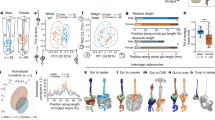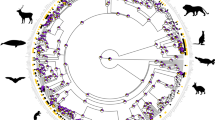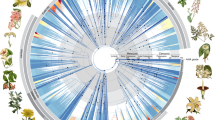Abstract
IN his review of Dr. de Beer's “Embryology and Evolution” (June 14, p. 883), Prof. MacBride appeals to readers of NATURE to decide between two theories of the origin of asymmetry in Gastropods. He supports the opinion that the weight of the shell stretched one side of the animal and crushed the other, thus initiating an inequality of growth. On the alternative view “a sudden and miraculous mutation” twisted the visceral hump and shell through 180°.
This is a preview of subscription content, access via your institution
Access options
Subscribe to this journal
Receive 51 print issues and online access
$199.00 per year
only $3.90 per issue
Buy this article
- Purchase on Springer Link
- Instant access to full article PDF
Prices may be subject to local taxes which are calculated during checkout
Similar content being viewed by others
References
Bridges and Morgan : Carnegie Inst. Pub. 327.
Author information
Authors and Affiliations
Rights and permissions
About this article
Cite this article
HALDANE, J. Origin of Asymmetry in Gastropods. Nature 126, 10–11 (1930). https://doi.org/10.1038/126010a0
Issue Date:
DOI: https://doi.org/10.1038/126010a0
This article is cited by
-
Viruses in Biology
Evolution: Education and Outreach (2012)
Comments
By submitting a comment you agree to abide by our Terms and Community Guidelines. If you find something abusive or that does not comply with our terms or guidelines please flag it as inappropriate.



